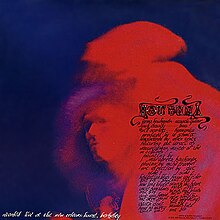Hot Tuna (album)
| Hot Tuna | ||||
|---|---|---|---|---|
 |
||||
| Live album by Hot Tuna | ||||
| Released | May 1970 | |||
| Recorded | September 16 to 24, 1969 New Orleans House, Berkeley |
|||
| Genre | Acoustic blues | |||
| Length |
45:59 67:51 (reissue) |
|||
| Label | RCA Victor | |||
| Producer | Al Schmitt | |||
| Hot Tuna chronology | ||||
|
||||
| Professional ratings | |
|---|---|
| Review scores | |
| Source | Rating |
| Allmusic |
|
| Robert Christgau | B+ |
| Rolling Stone | (not rated) |
45:59
Hot Tuna is the self-titled debut album by the American blues rock band Hot Tuna, released in 1970 as RCA Victor LSP-4353. It was recorded live at the New Orleans House in Berkeley, California in September 1969. It peaked at #30 on the Billboard 200 album chart.
Hot Tuna began as a means of relaxation for its two principals Jorma Kaukonen and Jack Casady while on tour with Jefferson Airplane, eventually becoming a separate entity within that band to the point of performing as its opening act. In the beginning, Hot Tuna would play in the style of electric Chicago blues often augmented by Airplane members, such represented by a cover of B.B. King's "Rock Me Baby" on the live Airplane album Bless Its Pointed Little Head. For their first album, Kaukonen and Casady decided rather on an all-acoustic set, playing the country blues of the pre-World War II era.
The Reverend Gary Davis had been an early influence on Kaukonen, and two of his songs were included on the album, with an additional pair included on the 1996 reissue. Casady and Kaukonen demonstrated their familiarity with early jazz and ragtime as well as blues by the inclusion of "Hesitation Blues," recorded by the Victor Military Band in 1916, and the inclusion of two numbers attributed to Jelly Roll Morton. They also ignored any purist notions of the delta blues with their cover of "How Long Blues" by Leroy Carr, who not only was not from the Mississippi Delta and did not play guitar, but was also one of the commercial urban blues successes of the 1930s.
...
Wikipedia
